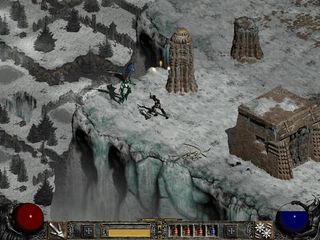23 years ago, 3 UCLA grads started Blizzard Entertainment
Twenty-three years ago this week, Michael Morhaime, Allen Adham, and Frank Perace founded a studio called Silicon & Synapse--later known as Chaos Studios (complete with bloody, oh-so-90s logo), and finally, Blizzard Entertainment.
Blizzard's significance to gaming should be pretty obvious. They're the studio behind games like StarCraft and World of WarCraft--genre-defining megahits that have transcended the medium and entered the mainstream consciousness. At one point, they dominated South Korea to the point that one of their games was the country's de facto national pastime. Suffice it to say, they've had a little bit of success over the years.

When Blizzard first opened their doors more than February 8, 1991 though, they were Silicon & Synapse--a tiny outfit that specialized in ports and the odd Super Nintendo release. They wouldn't become Blizzard until 1994--the year that they released WarCraft: Orcs & Humans and staked their claim as a key player in the then-brand new real-time strategy genre. Their early years were spent dealing with the sort of grunt work many fledgling studios have to take on to survive, such as porting the likes of Battle Chess II: Chinese Chess to the Commodore 64.
Unlike many other start-ups though, Blizzard (sorry, Silicon & Synapse) still managed to have a surprising amount of success out of the gate. Within two years, they were working on The Lost Vikings and Rock 'n Roll Racing -- games that still have many fans today. Blizzard was acquired by Davidson & Associates for $6.75 million not long after; and by 1996, they had their first true megahit in WarCraft II: The Tides of Darkness. Within five years, they had gone from anonymous startup with an equally innocuous name to a leading PC developer.

Ultimately, Blizzard's meteoric rise was a product of talent and good business sense, as well as a bit of serendipity. If Blizzard had decided to accept Interplay's offer instead of Davidson and Associates' back in 1994, for instance, history might have been very different. They also had the good fortune to get their start in the early 90s--a period of transition in the PC space that opened the door for new studios to rise to prominence. As with so many other success stories, Blizzard was the right company in the right place at the right time; and with that opportunity, they helped define gaming as we know it.
This Week in Gaming brings you bite-sized gaming history every week. Come back to find out what the past can tell us about the future, and to reminisce about a time before high-definition visuals, always-online DRM, and digital distribution.
Sign up to the 12DOVE Newsletter
Weekly digests, tales from the communities you love, and more

The devs of a legendary indie Zelda-like have a new retro action game with "bumpslash" combat, and its Steam Next Fest demo is a gem: "Fans of Ys, take note!"

And you thought Hollow Knight: Silksong is late – 37 years in the making, this retro Metroidvania has a whip-smart Steam Next Fest demo that's as Castlevania as it gets
Most Popular



